A Beginner's Guide to Lead Scoring: 5 Successful Examples
A Beginner's Guide to Lead Scoring: 5 Successful Examples

Converting lists into leads is a key goal of sales and marketing professionals. However, those who work in sales and marketing know that not all leads convert into paying customers or repeat buyers.
So, how can you figure out which leads are the most likely to convert into clients? And how can you make your campaigns more effective to generate more qualified leads?
This is where lead scoring comes into play — it’s one of the best tools to help speed up the lead generation process. In fact, lead scoring was named a key income contributor by 68% of professional marketers.
As a company who specializes in lead screening and intake, we’ve created a simplified guide to understanding what lead scoring is, including benefits and examples, so even beginners can incorporate a successful lead scoring strategy.
What is lead scoring?
Lead scoring is the process of rating leads based on a set of criteria to determine which are the most valuable to pursue. Your sales and marketing team calculates these scores based on various factors, such as:
- Their interaction and activity with your online presence, including your website, emails, and social media
- Relevant information they've submitted to you
- The likelihood of them fitting your ideal customer profile (ICP)
For each action a lead takes, they earn (or lose) points. The more points a lead has, the more qualified they are. Each action is assigned a point value, which is typically determined based on how far along the action is in the sales funnel.
For example, you might give higher scores to leads who visited pricing pages or filled out a demo request. On the other hand, you may deduct points from leads that unsubscribed to your email or only visit career pages on your site.
Once a prospect has reached a specific point total, they are considered a qualified lead, also known as a hot lead. Check out our full article on sales leads to learn more on how to classify each lead type.
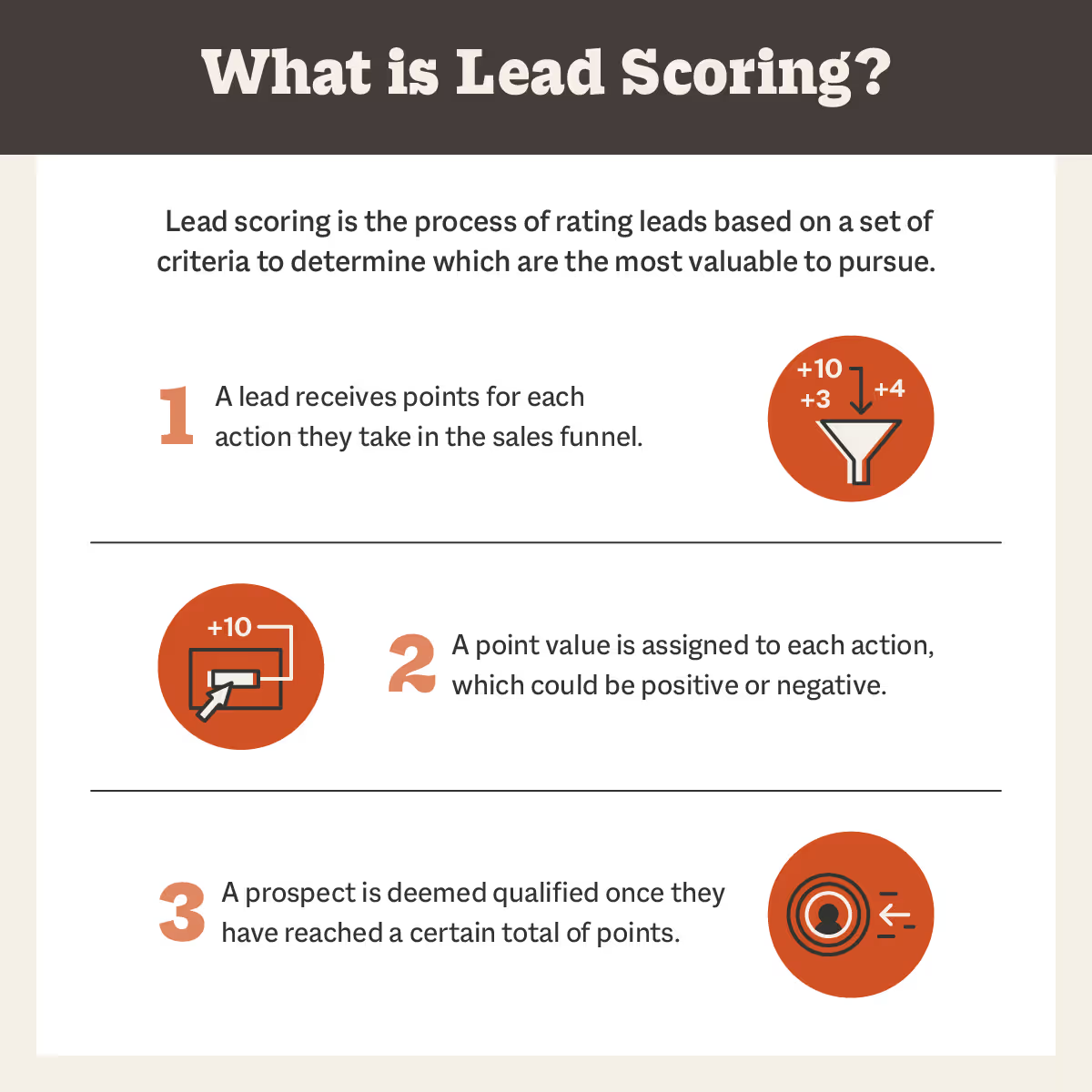
How does lead scoring work?
At this point, you may be wondering how lead scores are calculated.
Every business has its own scoring system for leads. One of the most popular techniques to help develop a value system and determine how many points each attribute is worth is analyzing data from prior leads.
By comparing the leads who became customers and the leads who didn’t, you can find common factors that indicate qualification. Then, based on how probable they are to signal a good fit for your offering, you can pick which attributes should be significantly weighted.
Every company's lead score will most likely be different, as some methods may work better than others depending on your business model.
Key takeaway: Each business should have a scoring system that is tailored to its unique goals and objectives.
What is the benefit of lead scoring?
Lead scoring helps businesses in determining which leads are worth pursuing and which are a waste of time, allowing them to improve the rate at which those leads convert into customers.
If you aren’t already convinced of the power of lead scoring, let us outline some more benefits of implementing this strategy into your lead generation process.
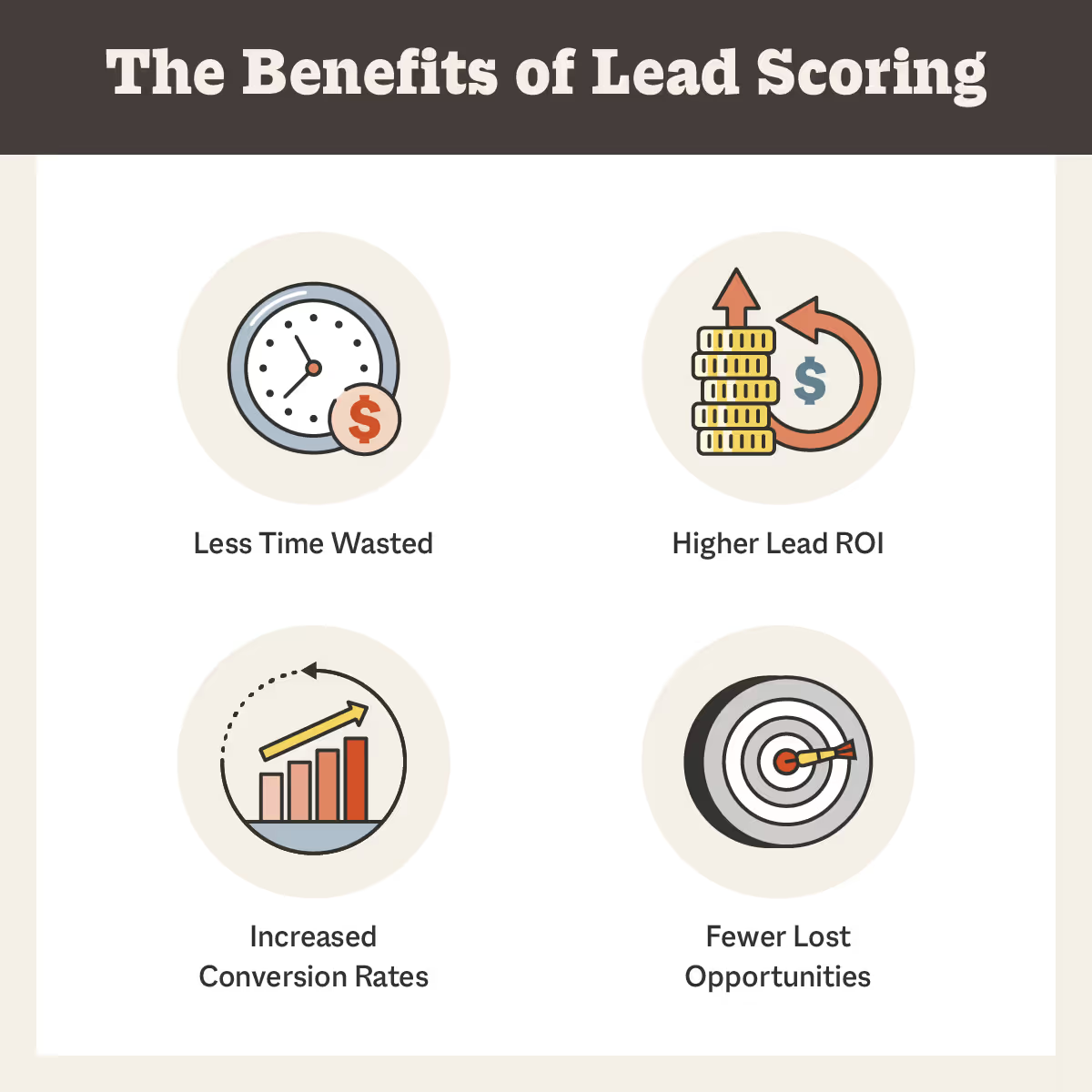
Fewer lost opportunities: Sales reps can often become overburdened with a long list of leads, making it harder to prioritize the ones that will actually convert. With 70% of leads being lost due to poor follow-ups, establishing a lead scoring process will help your sales team focus on leads that are worth the investment.
Higher lead ROI: By wasting less time and focusing your efforts on more qualified leads, you automatically achieve a higher return on investment. In fact, organizations who employ lead scoring see a 77% increase in lead generation ROI when compared to those that don't.
Increased conversion rates: Converting leads into sales is the ultimate goal of any sales strategy. Thanks to lead scoring, 38% of companies experience higher lead-to-opportunity conversion rates.
Lead scoring models
Lead scoring models ensure that the points you assign to each lead accurately represent their compatibility with your offerings.
Check out these six different examples of lead scoring based on how your leads may have interacted with your company.
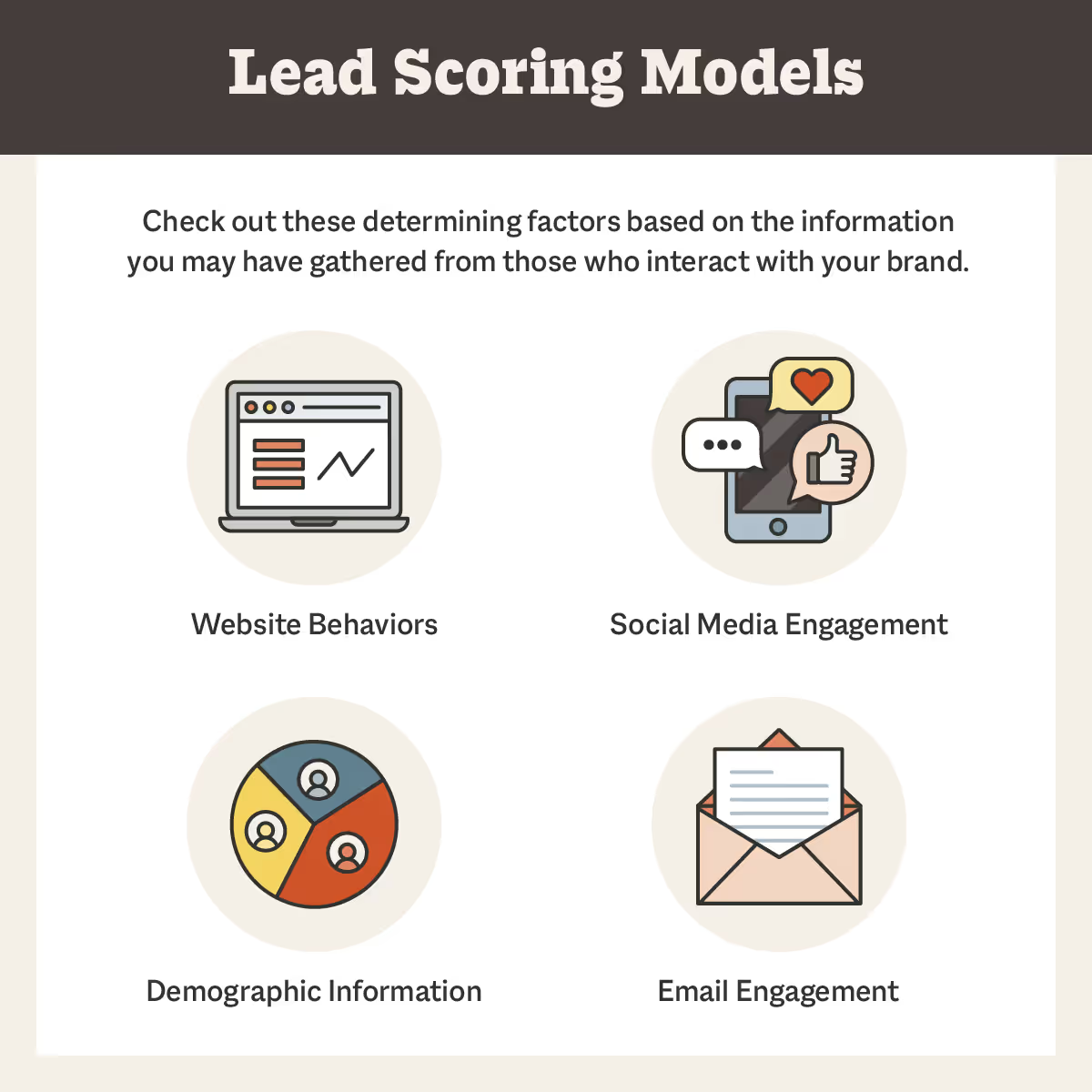
Website behaviors
Observing how a lead interacts with your website is one of the best methods to determine whether or not they are (or could be) interested in your offerings. Here are a few examples of online behavioral criteria you should look out for:
- Webpage visits
- Content downloads
- Demo requests
- Form submissions
- Webinar registrations
Take a look at the pages a lead views and what actions they take on your website. If they are visiting high-quality pages and downloading high-quality content, then you may give that lead a higher lead score.
On the other hand, if a lead is only viewing career pages, that may indicate they are only interested in employment opportunities rather than becoming a customer. In that case, you may deduct points.
You should also keep track of how many pages a lead views and how much time they spend on your website. You may give a lead a higher score if they visit 20 pages as opposed to a lead that only viewed two. Similarly, you may give a lead who stayed on your blog for an hour a higher score compared to a lead who stayed for only five minutes.
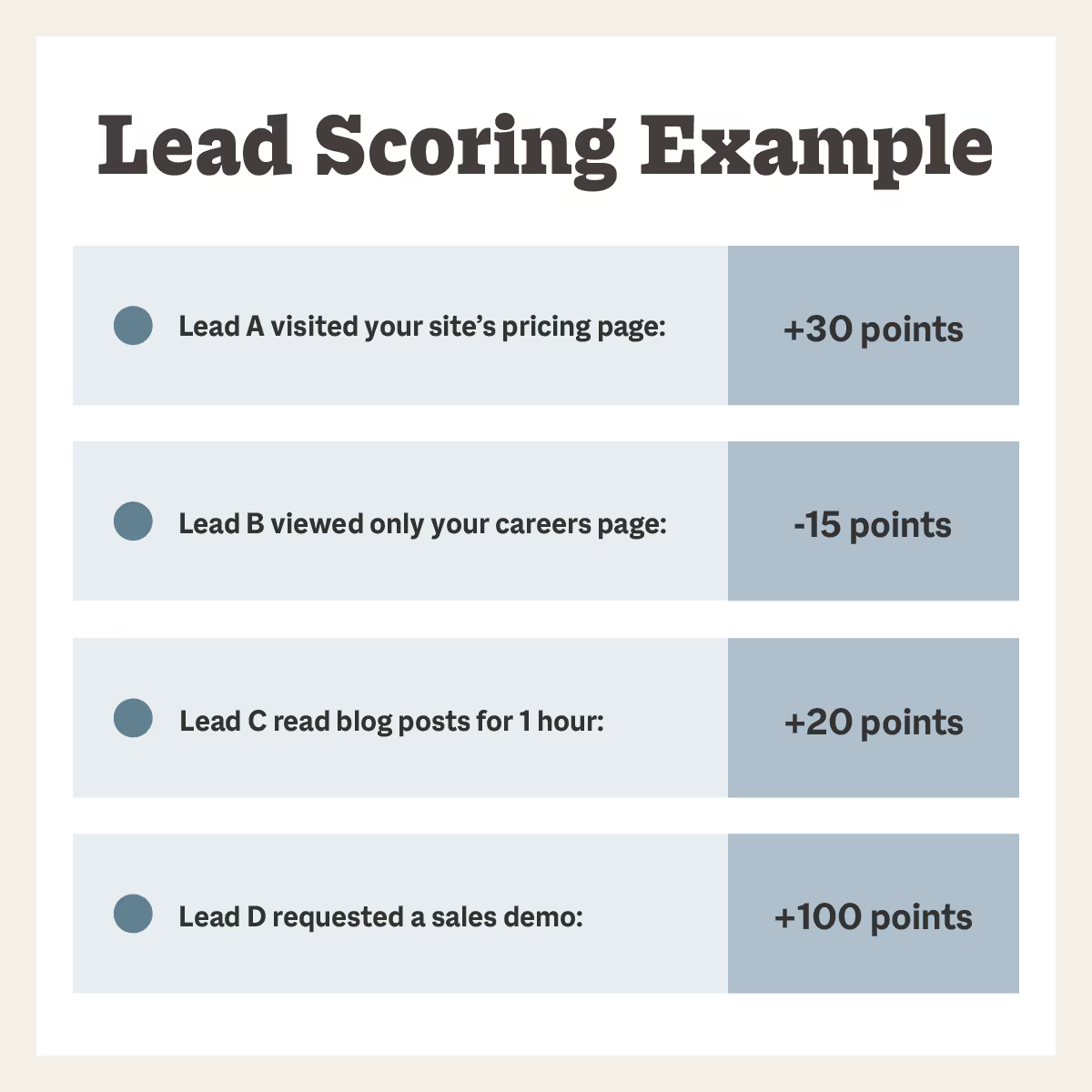
Disclaimer: The above example is a made-up point system and may not reflect what your company should score, as each business has its own definition of sales readiness.
Social media engagement
Another great indicator to determine a lead’s interest is the level of engagement they have with your brand on social media. Whether a lead follows, shares, likes, comments, or just clicks through your company’s posts, each action is worth a few lead scoring points.
For B2B companies, you might consider awarding additional points to potential buyers that have a large following or work for a company with a well-known brand name.
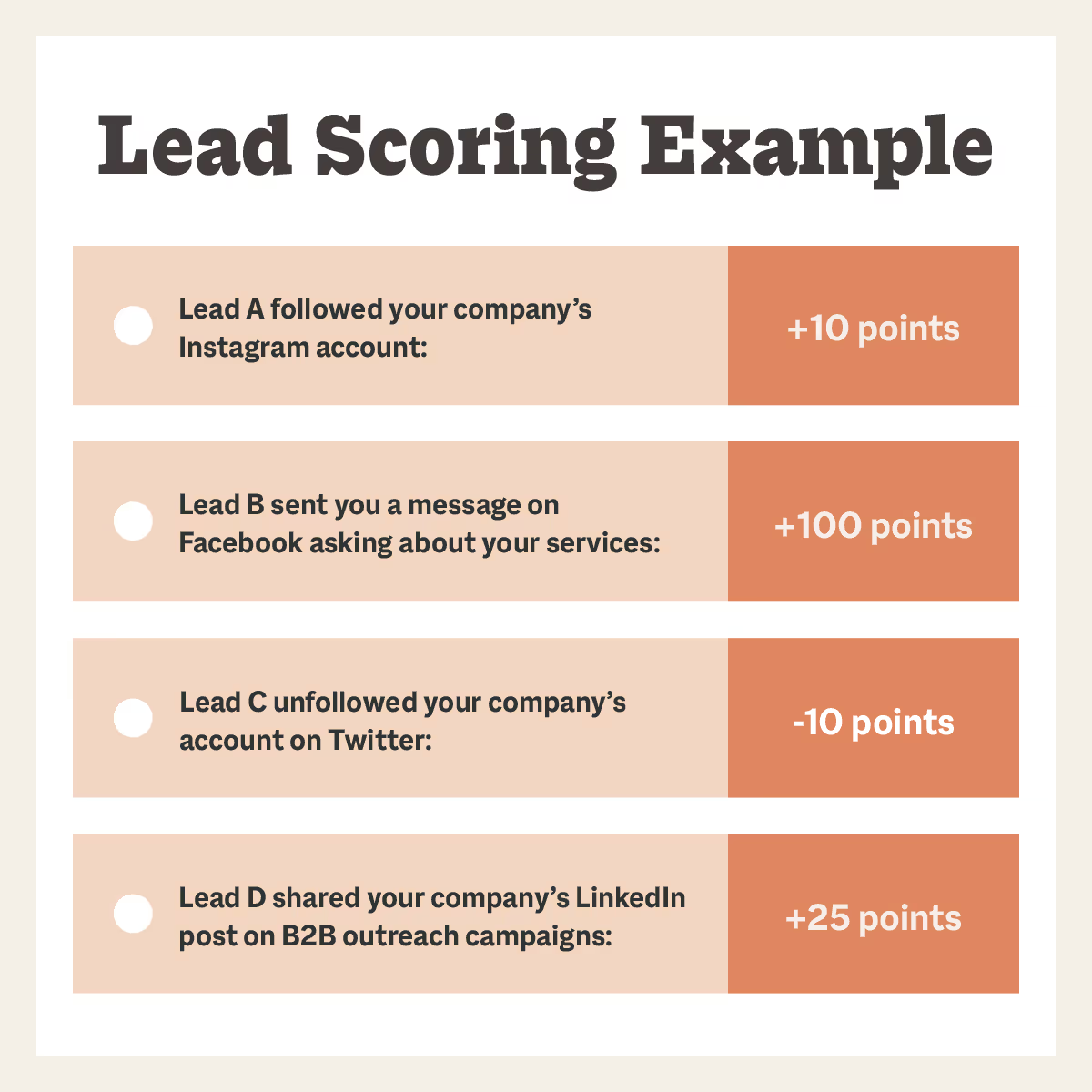
Disclaimer: The above example is a made-up point system and may not reflect what your company should score, as each business has its own definition of sales-readiness.
Email engagement
Email marketing campaigns are one of the most effective strategies in a company's lead nurturing process. The data you can gather from the engagement with these emails can be a telltale sign of whether or not they could be interested in becoming a customer.
If a lead subscribed to your emails, that’s a great sign and may be worth a few points. But the real meat and potatoes of observing email engagement is a lead’s open and click-through rates.
See which leads open all your emails and which ones click through them. Are any of these leads notorious for clicking through your promotional emails? Give them some points! Were any of those emails high value, such as a demo offer? Award them with additional points!
By observing these engagements, your sales team will know which leads are more qualified and which are still in the prospecting phase.
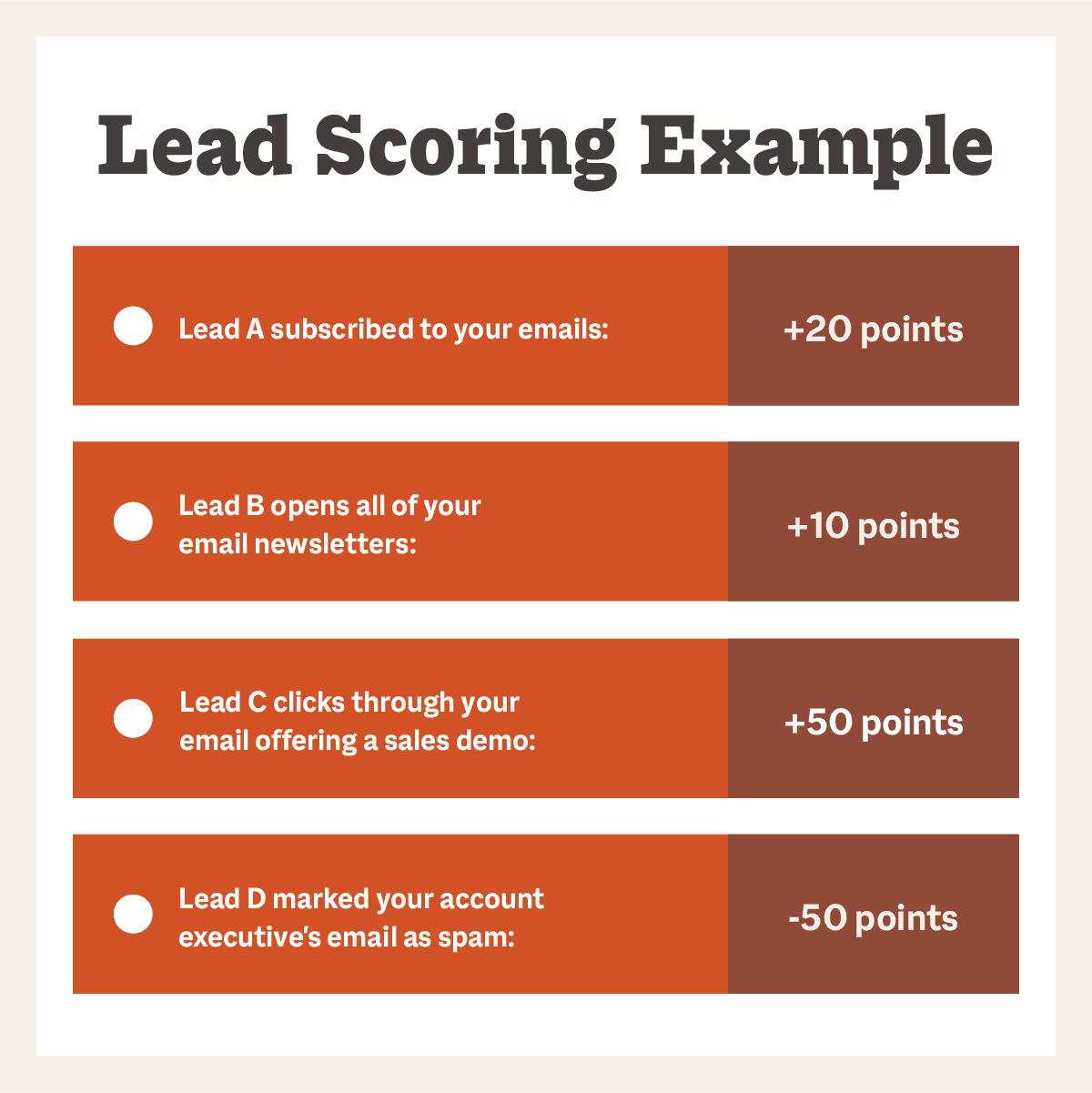
Disclaimer: The above example is a made-up point system and may not reflect what your company should score, as each business has its own definition of sales-readiness.
Demographic information
If your company exclusively sells to a specific demographic, keeping track of a lead’s demographic data is critical for determining whether they are in your target market. Some critical demographic information may include:
- Location
- Age
- Industry
- Company size
- Job title
- Department
If you are a company that sells B2B appointment scheduling services, for example, then companies in high call volume industries such as the legal or medical fields may be awarded more lead score points over those with lower call volumes.
Additionally, if your company only sells to a specific geographic area, then leads that fall outside of the proper city, state, ZIP code, country, and so on may have points deducted from their score.
In order to obtain this kind of information, you can provide forms on your landing pages that ask demographic questions. You can utilize their responses to see if they fit into your target market or not. By using demographic data to score leads, you can focus on those who are, in theory, a good match for your product or service.
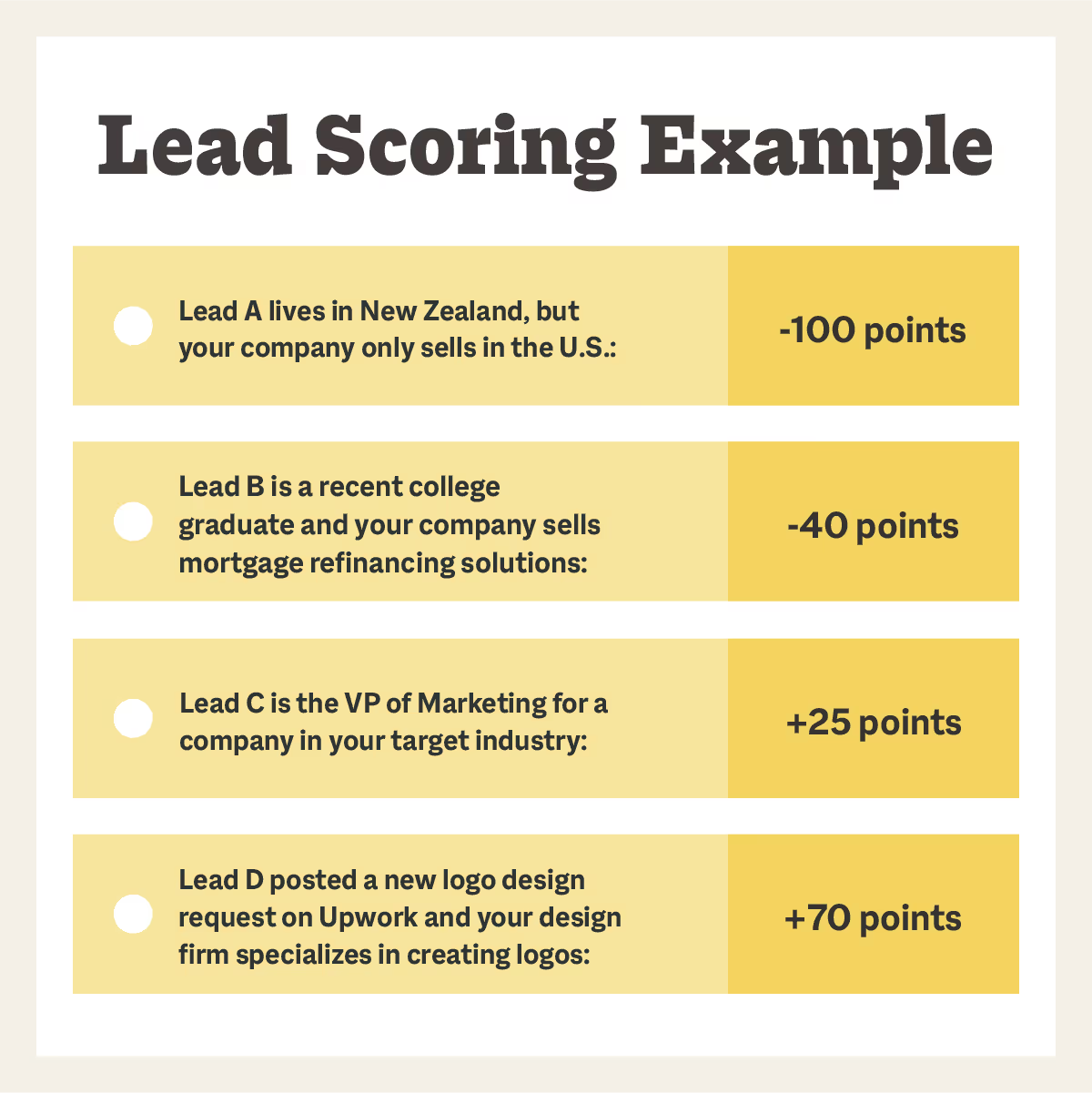
Disclaimer: The above example is a made-up point system and may not reflect what your company should score, as each business has its own definition of sales-readiness.
Lead scoring best practices
Now that you have some scoring examples in mind, use these lead scoring best practices to help make the process seamless.
Make sure you assign the right lead score
Once you’ve gathered that behavioral and demographic data, it’s time to assign your lead scores. Knowing how to score your leads properly is crucial to having a successful lead scoring system.
As mentioned earlier, the most common method for determining how to award scores is to examine data from all of your previous marketing initiatives to see which leads turned into customers.
Speak with your sales staff to learn more about the criteria that indicate whether a lead is qualified to become a customer, and speak with a few of your top customers to learn about the steps they took prior to deciding to become a client.
You'll be able to better understand which actions typically result in moving further down the sales funnel by talking with your reps and customers. For instance, if your sales team finds that a piece of content has a high conversion rate, you may give leads who download that piece of content or something similar a high point value.
Automate the process
Scoring leads without the use of a marketing automation technology takes time and can lead to data mistakes and lead routing issues due to potential human error.
Additionally, a lead's score will most likely vary as they progress through the sales funnel. It's nearly impossible to maintain track of a single lead's activity, let alone thousands of leads, without the use of an automated tool.
Fortunately, the majority of prominent marketing automation tools can take care of the full lead scoring process for you. Simply specify your scoring criteria, and the automated tool will score leads as they arrive, updating their ratings as they change. You'll be able to reap the benefits of lead scoring without putting in a lot of time and effort.
Qualify your leads with Smith.ai
Lead scoring is a great way to save businesses time and money. Smith.ai’s virtual receptionists manage the entire qualification and intake process so you can sit back and watch as new clients are scheduled and their completed client profiles are entered into your CRM.
Schedule a consultation or contact us to find out more ways Smith.ai can help you and your business.
Sources: CRM Lab | Gartner | MarketingSherpa
Take the faster path to growth. Get Smith.ai today.
Key Areas to Explore

Your submission has been received!














.svg)



